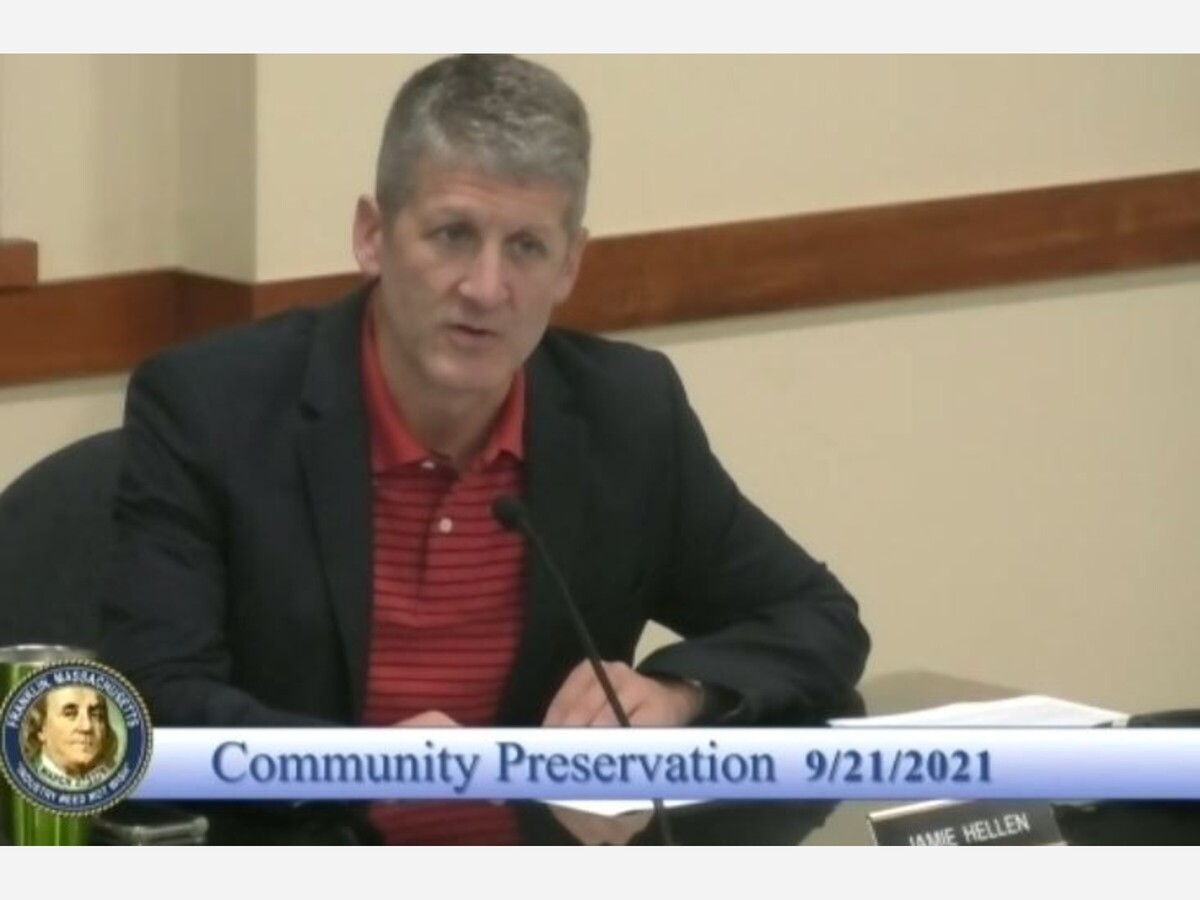Image


(Above, Town Administrator Jamie Hellen leads discussions at the Community Preservation Committee Meeting).
After a summer hiatus, the Community Preservation Committee (CPC) met in the Council Chambers on Wednesday evening, September 21, 2021.
After approving minutes, the Committee got an update on the planned historical tour dates, scheduled on September 29th from 4-6 pm at the Franklin Historical Museum at 80 West Central St., and the Red Brick Schoolhouse at the intersection of Main and Maple. The same venues will host an identical set of meetings on October 1st from 9-11 am.
Town Administrator Jamie Hellen, stressed that the events are aimed at CPC members and the general public, and both events will include presentations on projected restoration work by facilities director Mike D’Angelo. In particular, he will discuss removing the exterior paint on the Red Brick School, to return it to its original state.
The meeting then switched to affordable housing. Hellen noted that since the CPC was launched, they have had a series of presentations related to possible funding needs, the most recent being in June by Recreation Director, Ryan Jette.
Regarding the Chapter 61A property on Prospect Street, Hellen explained that there are two processes by which properties “protected” through the program come before the town for possible acquisition. He cited Maple Hill, which the town recently agreed to acquire, as one model wherein a developer gets permits and prepares to turn a property into housing (or some other form of development) and then the town gets the right to purchase if it so chooses and can afford the price.
The variation of the theme on Prospect Street involves notice of a “change in use,” which also triggers notice to the town. If the town chooses, it can have the property appraised, which in this case Franklin has done. And the landowner can, if he or she chooses, seek their own appraisal. If they do not agree, the two appraisers must select a third appraiser as a kind of tie breaker.
Hellen said the town’s appraisal has been completed and has been sent to the owner and the owner’s attorney. “They have until Oct. 23 to respond with their own appraisal,” he said.
When an appraisal is ultimately accepted by the parties, the clock starts ticking and the town has 120 days to act.
Hellen went on to report on some of the topics related to affordable housing. A portions of Community Preservation Act funding is reserved for this purpose. Hellen said the town’s top priority is Franklin Ridge, a 60-unit development off of Panther Way that is “a near carbon-copy of the existing Eaton Place senior housing development,” he explained. The town received a first $250,00 grant toward the project this year, he said.
Hellen also noted the challenges of creating more affordable housing because each project inevitably has a lengthy and complex development and approval process. “People say they want to build affordable housing but it isn’t that easy,” he said.
Town Planner Amy Love also reviewed the state-sanctioned housing production plan for attendees. “Around 2019 we reached 10 percent affordable and we had 11.96 percent in 2020,” she said. However, when the recent census data is digested, it is possible that number will be lower, she noted.
Hellen noted that the town had fallen below 10 percent until the Glen Meadow property went under new ownership that refocused on affordability. And, he noted, after the census numbers are finalized, whatever affordability number results will be with the town for a decade, though it is possible it could be amended if necessary.
David MacNeil, CPC member, asked Love about the goals and strategies mentioned in the plan to encourage more affordable housing. “Do you have something in mind,” he asked.
Love said mostly, the thinking is related to goals and incentives to try to get developers to add an affordable component to a project. Hellen noted that most neighboring towns have already implemented inclusionary zoning [a mandatory approach that requires developers to make a portion of the housing units in their project affordable to low- and moderate-income households].
Chestnut Street resident Rick Ciccone, phoned into the meeting to express his thought on affordability. He noted that Glen Meadow had begun as affordable when it was first built decades ago and then moved toward market rate and he speculated that Glen Meadow could go that way again in the future, making it vital to create more such housing.
He said developers routinely get waivers for many things but should be asked to provide affordable elements in return in the future.
“For the greater good you need to work within your numbers of how much we make on each and every development,” he said. “We need for Franklin folks to take care of Franklin folks and if you can’t take care of this you should develop somewhere else,” he added.